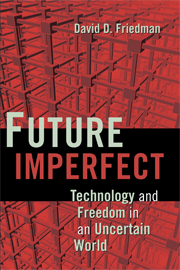I Choosing Our Own Future, from the May issue of Reason, Gregory Benford reviews Future Imperfect, glossing on David Friedman’s views on surveillance, reproduction, and other biotech issues.
~ ~ ~
 In Future Imperfect David Friedman presents a wide variety of possible futures, “some attractive, some frightening, few dull.” Looking through a lens of science fiction and fact, Friedman explores how libertarian ideas can help us adjust our lives and institutions to technological change ranging from computer crime to nanotechnology, from contracts in cyberspace to aging research.
In Future Imperfect David Friedman presents a wide variety of possible futures, “some attractive, some frightening, few dull.” Looking through a lens of science fiction and fact, Friedman explores how libertarian ideas can help us adjust our lives and institutions to technological change ranging from computer crime to nanotechnology, from contracts in cyberspace to aging research.
Friedman, a professor of law at Santa Clara University and the author of the libertarian classic The Machinery of Freedom, applies law to economics and economics to the law, enhancing our understanding of both. He is properly skeptical of lawsuits: “Litigation is a clumsier and less efficient mechanism than trade; on average, of every dollar spent by a defendant only about fifty cents ends up with a plaintiff, the rest going to lawyers, court costs, and the like.” Yet future technologies will have to pass through the legal wringer, and Friedman excels at projecting what will happen when they do.
Take online privacy. Friedman’s view picks up from David Brin’s foundational 1998 book The Transparent
Society: Public surveillance is clearly growing, banks and governments monitor credit and bureaucratic transactions, cameras in public areas have been effective at reducing crime in Europe and their use will inevitably rise. Some law enforcement officials are arguing that governments should use microphones to augment the cameras. Friedman thinks they soon will cover every urban area in every developed nation.
The scenario sounds Orwellian, but Friedman (and Brin) argue that we can use it to enhance our freedom. For this to happen, surveillance cannot be a police privilege; it must belong not just to the powerful but to everyone. In the Friedman/Brin vision, instead of a centralized state watching its subjects, everyone will watch each other. The cameras become a public resource, assuring that no mugger is hiding around the corner, that our children are playing safely in the park, and that police are not abusing their power.
Latest Comments
Have your say!